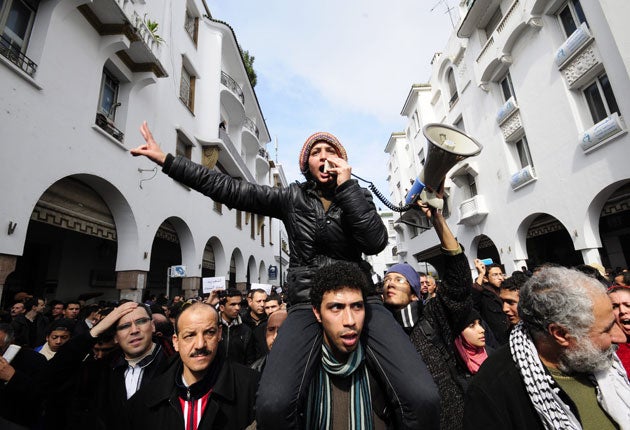Inspired by Egypt, thousands protest on Moroccan streets

Thousands of people flooded on to the streets of cities across Morocco yesterday, hoping to wrest some powers from the ruling monarchy in the first large protests inspired by events in Tunisia and Egypt.
At the front of the nearly thousand-strong crowd in Casablanca, excited youth held aloft a banner bearing the image of Mohammed Bouazizi, the Tunisian vegetable seller, whose self-immolation touched off the Arab revolt. They admired his sacrifice, but were revealingly modest in their demands.
A larger demonstration took place in the capital Rabat, where some 5,000 protestors gathered opposite parliament. Smaller protests took place in Marrakech and Tangiers.
The chants echoed the Cairene at times, but differed crucially. “The people want an end to corruption,” they chanted, wrapped in Moroccan flags, under the gentle drizzle that fell over Casablanca’s Place Mohammed V, a square of tasteful Mooresque, colonial-era government buildings. In Egypt, they demanded the end of the regime.
Direct references to King Muhammad VI, the ruling monarch, were also scarce. Some held aloft banners, denouncing the government, but paying homage to the 47-year-old king, who inherited this kingdom from his father Hassan II eleven years ago.
Even the doughtiest protestors dared not utter his name. “First was Ben Ali, second was Mubarak...we know who’ll be the sixth,” they chanted, in muffled ambition.
The protests were backed by Morocco's rebel prince, Moulay Hicham, the king's first cousin and third in line for the throne. Since the ascent of Muhammad Vi, Prince Hischam has urged the democratisation of Morocco, to the chagrin of this ruling family.
"Personally, I support any initiative that calls for the democratization of our political system, taking into account the necessity that this be done in a peaceful and tolerant manner," Prince Hicham, known locally as the "red prince" for his progressive views, told an interviewer recently. The urbane and popular prince lives in the United States and is a fellow at Stanford University.
Since assuming the throne, Muhammad VI has cast himself as the “king of the poor” and the “king of women”. His chubby cheeked, youthful visage is widely in evidence. Now bearded, he smiles kindly on bars and restaurants, keeps vigilant watch over fruit sellers and cafes.
“We want the king to reign, but not rule,” said Reda Oulamine, an articulate 38 year old lawyer. “Why can’t we have a constitutional monarchy like England or Spain?”
While Morocco has the trappings of a more liberal regime, with dozens of political parties, unions and civil society groups, power remains tightly concentrated with the monarchy, the protestors say.
A fifth of the budget is lavished on its palaces, while the monarchy controls a vast empire of business interests, including the largest bank and mobile phone company. “The king’s holding conglomerates should be returned to the people,” said Tarik Armili, 30, a businessman. “We want our wealth back.”
Officially, unemployment in Morocco is at 10%, but Moroccans insist that it is several fold higher. Casablanca, Morocco's largest city and commercial hub, is itself a study in contrasts. Like Cairo and Tunis, appalling mass poverty lies not far from the fabulous wealth of the few.
Criticism is possible, but heavily circumscribed. Newspapers studiously avoid unflattering mentions of the king and his top generals. There isn’t even the faintest whisper of the longstanding territorial dispute over Western Sahara. “We need justice, health and education,” said Mr Oulamine. “There is no independent judiciary, the king appoints fearful judges. The old have no healthcare. And there is no investment in schools. Most of the country is illiterate.”
Many were disappointed by the turnout. “There is a fear,” said a teacher who stayed at home. “I have sympathy with the protestors, things are bad here. But I don’t want there to be any trouble in my country.” Trains between Rabat and Casablanca were stopped, while checkpoints lay athwart many Moroccan cities.
The protestors' ranks were also thinned by the absence opposition political parties. Fearful of angering the establishment, and perhaps losing their largely symbolic places in parliament, no mainstream party backed the protests. Adl wa Ahsan, the underground Islamist party, also failed to mobilise its boasted vast membership.
The small, peaceful numbers may even help burnish the regime’s self-image as a more tolerant, stable Arab country. “But this is an important first step,” said Mr Oulamine. “Maybe not now, but maybe in the next five years, change will come to Morocco.”
Join our commenting forum
Join thought-provoking conversations, follow other Independent readers and see their replies
Comments
Bookmark popover
Removed from bookmarks